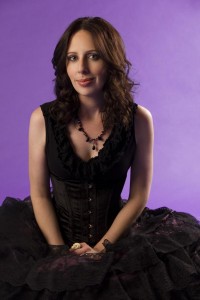This month saw the U.S. release of The Inexplicables, the latest in Cherie Priest’s Clockwork Century series, out in the U.K. on Valentine’s Day 2013. High time we caught up with the Queen of Steampunk herself to ask a few whys and wherefores regarding her world. You can see the insights we gathered below. Cherie has also put together a wonderful collection of steampunk images for us here. If you haven’t seen it yet, it comes highly recommended. And now on to those questions….
1.) Why did you call your first Clockwork Century novel “Boneshaker”?
Because it’s a fun word. I saw it in passing, attached to a .gif of a friend of mine riding an old-fashioned bicycle—a “boneshaker” as they were called, for they were so hard on the rider. And I thought…man, if you didn’t know it was a bicycle, that word could reference all kinds of things! A weapon, a vehicle, a blend of coffee. And that’s when I realized what the name for Dr. Minnericht’s mining device ought to be. It was perfect! And even though the device itself barely appears in the book, everything that happens—to Briar or Zeke alike—happens because of it. So it only seemed right and fair to name my story after it.
2) What are the best things about steampunk, in terms of the storytelling tools this sub-genre gives an author?
I think my favorite storytelling tool in steampunk is probably the real history that you get to steal, co-opt, tweak, and otherwise use or abuse. The fact is, nothing I could make up is half so weird as some of the things that have actually happened. It’s also true of characters—I could never invent anyone half so crazypants as some of the people who really lived.
And of course, then you can remix the events and the people. For example, in Dreadnought I feature two real-life American women on the opposite sides of a war…who collaborate for a common goal, early in the book. To the best of my knowledge they never met, but I imagined they’d have quite a lot to talk about. This is also true of Clementine, where I wrote a famous Southern spy and sent her to work for the Pinkerton National Detective Agency after she retires from espionage. This almost certainly would’ve never happened, but it sure was fun on paper….
3) You are famed for writing strong female protagonists. Which female character within the Clockwork Century universe do you find most interesting and why?
Hmm…it’s hard to say. Briar Wilkes was my first, and she remains quite close to my heart (and she turns up in subsequent books, so I didn’t abandon her altogether after that initial foray into the universe). I’m also a bit attached to my Dreadnought nurse, Mercy Lynch. My father and stepmother were both military nurses for decades, and the research on that one was particularly interesting, if sometimes gruesome. But my spies—Maria Boyd (Clementine, and upcoming Fiddlehead) and Josephine Early (Ganymede) were also challenging and fun in their own ways.
4) Are there any particular challenges in writing these historical female characters from our modern perspective?
It’s always a tight-rope to walk, when writing historical women, because I can’t have them proceed through the narrative with too much modern-style autonomy, but there were plenty of tough women in the past who wielded quite a lot of power despite their gender (or even because of it). This is what I’m trying to say: If I throw too many obstacles in their paths, I risk telling a story about the obstacles, not the women; but if I ignore the obstacles altogether, then the story doesn’t ring true. All I can do is struggle to find some balance in the middle ground.
5) What is your favorite imaginary weapon or gadget in the Clockwork Universe novels so far and where did the inspiration come from?
Probably Dr. Minnericht’s Daisy Doozer—a bazooka-type weapon that uses a pulse of sound to stun the zombies, but only for a short period of time…and the weapon takes a good fifteen minutes to charge, so you have to deploy it wisely. I’m not entirely sure where the idea came from. I guess I just liked the thought of a stun-gun for use against the undead.
This post originally appeared on Tor UK.
Bella Pagan is the senior commissioning editor for Tor UK: working on out-of-this world SF, fantasy and urban fantasy (plus other subdivisions, factions and associated areas) for Tor UK. On twitter as @BellaPagan.










